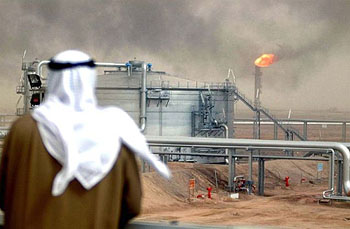Saudi Arabia has long said that it has loads of untapped reserves and would, within a few years, be on track to increase oil production from 10 million barrels per day to as much as 15 million barrels of oil per day. But Saudi production has stayed stubbornly at 10 million barrels. Last  week, the CEO of Saudi Aramco said that global production from tar sands and shale oil now looked so promising that there was no need for more oil from the Kingdom:
week, the CEO of Saudi Aramco said that global production from tar sands and shale oil now looked so promising that there was no need for more oil from the Kingdom:
“Rather than supply scarcity, oil supplies remain at comfortable levels, even given rising demand from fast-growing nations like China and India….All that makes spending on aggressive energy programmes unlikely,” he said, adding that abundant affordable hydrocarbon supplies challenged investment in renewable technologies. As a result, Saudi Aramco had no plans to increase its oil production capacity to 15 million barrels per day, Falih said.
Should you believe this? No, you shouldn’t. Chris Nelder has a nice piece today at SmartPlanet called “Why energy journalism is so bad,” and at the end he provides six pieces of advice for reading press reports about oil and energy more broadly. Here’s one of them:
2. Discount the sources. If the cited authority represents the oil and gas industry, you should view their forecasts as propaganda, not truth. Particularly when the authority is from an OPEC producer. OPEC (like the IEA) is a fundamentally political organization, and everything they say in public has a political calculus behind it. For example, I read the unconventional oil optimism expressed by the Saudi official cited at the top of this piece as their way of jawboning down peak oil fears, and throwing analysts off the scent of a trail which leads to serious questions about whether Aramco can increase spare production capacity, and whether the world’s most productive oil field, Ghawar, has indeed gone into decline.
Saudi Arabia has been making excuses for years for their inability to produce more than 10 million barrels of oil per day. This is the latest, and seemingly, the most definitive. They’re publicly stating — for the first time, I think — that they aren’t going to keep up the pretense anymore. Their exploration and drilling program is over, and 10 million barrels is as good as it’s ever going to get.
The rest of Nelder’s piece is worth reading if you want to understand a bit more about how energy journalism is put together. There really is reason to think that shale oil and fracking (as well as tar sands) will boost production of fossil fuels over the next decade or two. But you should be very, very skeptical of the happy talk about massive new finds and how this means energy independence at last. This stuff is promising, but every field isn’t going to pan out at the most optimistic end of the forecasts, just like conventional oil fields don’t all pan out at the most optimistic end of the forecasts. Caveat emptor.








